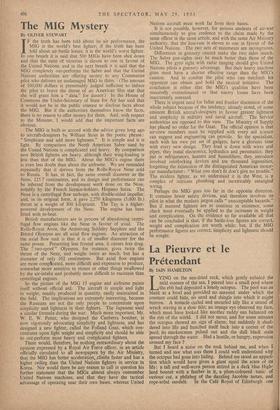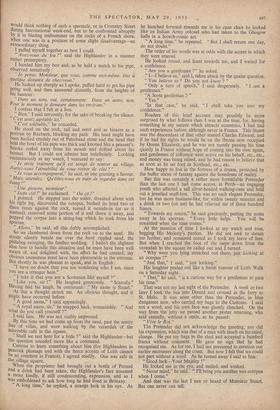La Pieuvre et le Pretendant
By LAIN HAMILTON I4YING on the sun-dried rock, which gently exhaled the mild essence of the sea, I peered into a small pool where the ebb had deposited a lonely octopus. The pool was as blank as a bowl and provided no seaweed under which the creature could hide, no sand and shingle into which it might burrow. A tentacle curled and uncurled idly like a strand of wrack waving in a slow tide; an orange eye observed my face, which must have looked like another ruddy sun balanced on the rim of the wcirld. I did not move, and for some minutes the octopus showed no sign of alarm; but suddenly it shud- dered into life and hunched itself back into a corner of the pool; its smokescreen pulsed out and the dull black stain spread through the water. Had a hostile, or hungry, expression crossed my face ? But I heard a noise on the rock behind me, and when I turned and saw what was there I could well understand why the octopus had gone into hiding. Behind me stood an appan- tion which would have given a giant squid the scare of its life: a tall and well-worn person attired in a dark blue High- land bonnet with a feather in it, a plum-coloured tunic of curious cut, a philabeg of the dazzling Jacobite tartan, and rope-soled sandal. In the Café Royal of Edinburgh one Would think nothing of such a spectacle, or in Coventry Street during International week-end, but to be confronted abruptly by it in blazing midsummer on the rocks of a French shore, When one was in a position of some slight disadvantage—an extraordinary thing. I pulled myself together as best I could. " Avez-vous du feu ?" said the Highlander in a manner rather peremptory. I handed him my box and, as he held a match to his pipe, observed tentatively : " Je pense, Monsieur, que vous, comme nzoi-nzeme, etes ii quelque distance de chez-vous."
He looked up sharply as I spoke, puffed hard to get his pipe going well, and then answered distantly, from the heights of "his hauteur: " Dans un sens, oui, certainement. Dans un autre, non. Pour le moment je'demeure dons les environs." I confess that I felt at a loss.
"Bien," I said nervously, for the sake of breaking the silence. " C'est assez agreable ici." "C'est tolerable," he conceded.
He stood on the rock, tall and erect and as bizarre as a Portrait by Raeburn, blocking my path. His head might have been hacked crudely out of Peterhead stone and the hand that held the bowl of his pipe was thick and knotted like a peasant's. Smoke curled away from his mouth and drifted about his bonnet. But I could not admire him indefinitely. Looking ostentatiously at my watch, I ventured to say : " Je crois vraiment qu'il est temps de rentrer au village. A uriez-vous l'aimabilite de vous retirer de cote?"
" Je vous accompagnerai," he said, as one granting a favour. " Mats, attendez. Qu'etiez-vous en train de regarder dons cet eking ?"
" Une pieuvre, monsieur." "Juste ciel!" he exclaimed. "O11 ca ?" I pointed. He stepped into the water, threshed about with his right leg, discovered the octopus, bashed its head two or three times against the rock, turned it outside-in (or so it seemed), removed some portion of it and threw it away, and Popped the corpse into a string-bag which he took from his Sporran.
" Allons," he said, all this deftly accomplished. So we clambered down from the rock on to the sand. He strode silently beside me over the hard rippled sand, the philabeg swinging, the feather nodding. I hadn't the slightest idea how to handle this situation and he must have been well aware of, and delighted with, the effect he had created; my. 'obvious uneasiness must have been pleasurable in the extreme. But shortly he was pleased to speak, and in English : "I have no doubt that you are wondering who I am, since You are a stranger here." - " I take it that you are a Scotsman like myself ?" "Like you, sir 1" He laughed generously. "Scarcely." Having had his laugh, he continued : "My name is Stuart." At this a thought struck me. An obvious thought, and it Might have occurred before.
A good name," I said appeasingly. "A royal name, sir," he snapped back, womanishly. "And What do you call yourself ?" I told him. He was not visibly impressed. By this time we had come up from the sand, past the sentry line of villas, and were walking by the verandah of the miserable café in the square. "Shall we rest here for a little ?" said the Highlander—but the question sounded more like a' command.
Curious to learn something about him (for Highlanders in Peacock plumage and with the fierce accents of Leith cannot be so common in France), I agreed readily. One was safe in the village square. When the proprietor had brought out a bottle of Pernod and a drink had been taken, the Highlander's face assumed a more kindly, if still condescending, expression, and so I Was emboldened to ask how long he had lived in Brittany. "A long time," he replied, a strange look in his eye. As he hunched forward towards me in his cane chair he looked like an Indian Army colonel who had taken to the Glasgow halls in a Scotch-comic act.
"A long time," he repeated. "But I shall return one day, do not doubt."
The order of his words was at odds with the accent in which they were uttered.
He looked round, and leant towards me, and I waited for a confidence.
"Are you a gentleman ?" he asked.
" I—I believe so," said I, taken aback by the quaint question. "You believe so ? Do you not know ?"
"Only a turn of speech," I said desperately. "I am a gentleman."
"A Scots gentleman ? "
"Yes." , "In that case," he said, "I shall take you into my confidence."
Readers of this brief account may possibly be more surprised by what follows than I was at the time, for, having something in my nature which attracts eccentrics, I had had such experiences before, although never in France. This Stuart was the descendant of that other named Charles Edward, and if he had his rights he would be on the throne now occupied by Queen Elizabeth, and he was not merely passing his time quietly in France without hope of coming into his own again, and gentlemen of influence were active on his behalf, etc., etc., and money was being raised, and he had reason to believe that as soon as he set foot in Scotland, etc., etc.
How happy to live in the fortress of a dream, protected by the buffer states of fantasy against the boredoms of reality.
But this was certainly a rather more formidable Pretender than the last one I had come across, in Perth—an engaging youth who affected a tall silver-headed walking-cane and held out a jewelled snuff-box. This was no such elegant Pretender, but he was more business-like, for within twenty minutes and a drink or two (on me) he had relieved me of three hundred francs.
"Towards my return," he said graciously, putting the notes away in his sporran. "Every little helps. You will be rewafded when the time comes."
At the mention of time I looked at my watch and rose, begging His Majesty's pardon. He did not seek to detain me further, and remained seated as I took my leave of him. But when I reached the foot of the steps down from the verandah to the square he called out and I turned. "Why were you lying stretched out there, just looking at an octopus ?" ' "Just that," I said, " just looking."
His laughter pealed out like a harsh rumour of Leith Walk on a Saturday night. " That," he said, "is a curious way for a gentleman to pass his time."
That was not my last sight of the Pretender. A week or two later I took the bus into Dinard and crossed in the ferry to St. Malo. It was none other than the Pretender, in blue dungarees now, who carried my bags to the Customs. I said not a word, and his own face was glumly clenched. On the way from the jetty we passed another porter returning, who said casually, without a smile, as he passed : "Vive le Rol."
The Pretender did not acknowledge the greeting, nor did his expression, which was that of a man with much on his mind, change. He put my bags in the shed and accepted a hundred francs without comment. He gave no sign that he had recognised me. As for me. I had not presumed to mention our earlier encounter along the coast. But now I felt that we could not part without a word. As he turned away I said to him: "Good luck—Your Majesty 1" He looked me in the eye, and smiled, and winked.
"Never mind," he said. "I'll bring you another wee octopus when I come."
And that was the last I saw or heard of Monsieur Stuart. But one never can tell.



































 Previous page
Previous page